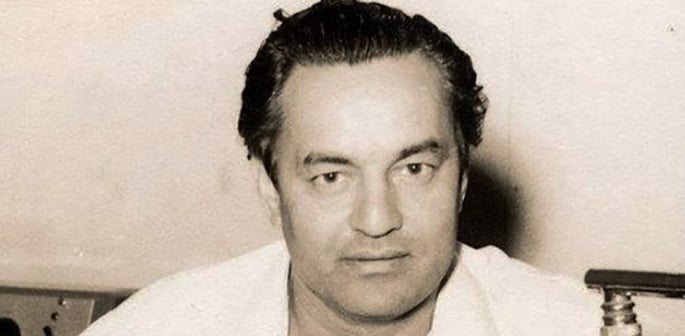"His songs were his only."
Mukesh Chand Mathur is one of the most influential and loved singers of Indian film music.
Beginning his career in the 1940s, he quickly cemented himself as a reigning playback singer.
He dabbled in acting as well but his main calling was always singing.
Mukesh Sahab stands out for his beautiful, nasal tone which remains his unique selling point.
Through a career spanning over three decades, he cultivated many everlasting songs.
Are you an aficionado of classic Bollywood music?
DESIblitz proudly invites you on a musical odyssey as we explore the life and fascinating career of Mukesh Chand Mathur.
Early Life & Career Beginnings
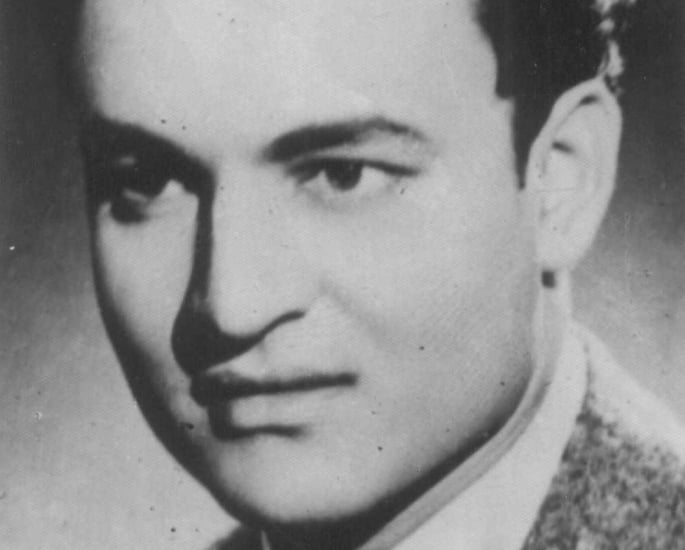 Mukesh Chand Mathur was born on July 22, 1923, in Delhi and was inclined towards music from an early age.
Mukesh Chand Mathur was born on July 22, 1923, in Delhi and was inclined towards music from an early age.
He was an ardent fan of the great singer-actor, Kundan Lal Saigal.
In his youth, Mukesh Sahab held a government job in Delhi. It was during his employment that he honed his talent for singing.
He also developed musical instrument skills.
In 1940, Motilal was reigning supreme as one of Indian cinema’s leading stars.
Motilal was also Mukesh Sahab’s distant relative. Motilal noticed him singing at a family wedding.
The actor was so impressed that he encouraged Mukesh Sahab to join him in Mumbai (then Bombay) and seek a career in films.
However, few are aware that Mukesh Sahab’s entry into the industry was marked by acting.
He starred in Nirdosh (1941) opposite Nalini Jaywant. This was followed by Adab Arz in 1943.
In 1945, Mukesh Sahab released his first song as a playback singer. It was named ‘Dil Jalta Hai‘ and is from the film Pehli Nazar.
Pictured on Motilal himself, Mukesh Sahab uncannily imitates Saigal in the song.
It is said that when Saigal heard the song, he remarked:
“That’s strange. I don’t recall singing that song.”
The maestro was bowled over by Mukesh Sahab’s voice and he gifted the young singer with a harmonium.
In 1946, Mukesh Sahab married Saral Trivedi Raichand who was a millionaire’s daughter.
At first, Saral’s family was unwilling to accept Mukesh as they disapproved of Mukesh’s singing career and non-vegetarianism.
Despite this, the couple weathered the challenges and enjoyed a loving marriage that lasted for the rest of Mukesh Sahab’s life.
They had five children together including Nitin Mukesh, who would also go on to become a renowned face in the realm of playback singing.
The Eternal Bond With Raj Kapoor
 Although his early songs saw him continue his Saigal style, Mukesh Sahab caught the attention of the composer Naushad Ali.
Although his early songs saw him continue his Saigal style, Mukesh Sahab caught the attention of the composer Naushad Ali.
Naushad encouraged Mukesh Sahab to develop his niche and he introduced the singer as the voice of Dilip Kumar in Mela (1948).
In 1949, Naushad created music for Andaaz which starred Dilip Sahab and Raj Kapoor.
Naushad had Mukesh Sahab sing for Dilip Sahab while Mohammad Rafi provided the playback for Raj Sahab.
The same year, Raj Sahab helmed Barsaat in which he also featured along with Nargis.
In Barsaat, Mukesh Sahab sang several chartbusters that were pictured on the actor.
This started one of the most evergreen actor-singer combinations in Indian movie history.
Mukesh Chand Mathur sang a staggering total of 110 songs for Raj Sahab.
With Barsaat, Mukesh Sahab also started a winning partnership with the composer duo, Shankar-Jaikishan.
The pair helped the singer achieve the monumental success that he is revered for.
After Mukesh Sahab died, Raj Sahab commented:
“There was Mukesh – my soul, my voice. I was just a mere body. It is he who sang through the hearts of people all over the world. Not me.
“Raj Kapoor was an image – just a carcass of flesh and bone.
“He was the soul and when he died, I felt, ‘There goes away my breath’.
“I know what went from me and there was a void and vacuum.”
Reigning Supreme
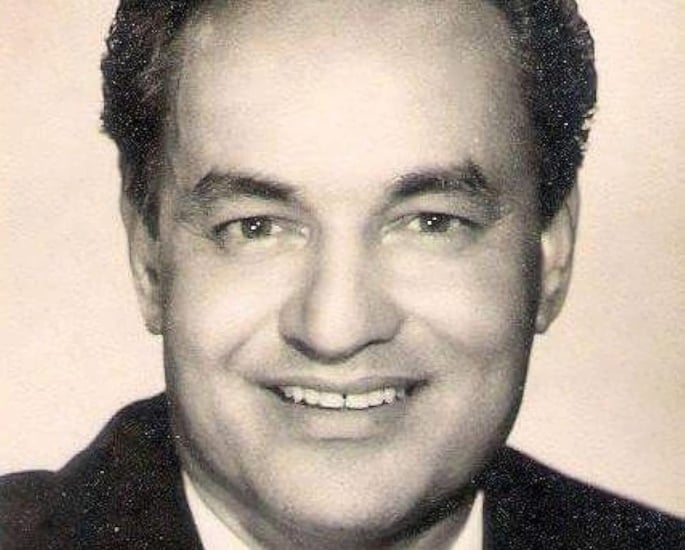 In the 1950s, Mukesh Chand Mathur was one of the most sought-after male playback singers.
In the 1950s, Mukesh Chand Mathur was one of the most sought-after male playback singers.
He enjoyed tremendous adulation along with artists including Mohammad Rafi, Hemant Kumar, and Talat Mahmood.
In 1953, he performed a guest role in Aah which starred Raj Kapoor in the lead.
He also appeared in Mashooka (1953) opposite the singer-actress Suraiya.
In 1956, Mukesh Sahab produced and starred in Anurag for which he also composed the music.
However, unfortunately, he was unable to gain substantial footing as an actor and from the mid-1950s, he concentrated solely on playback singing.
In 1960, Mukesh Sahab became the inaugural recipient of the Filmfare Award for ‘Best Playback Singer’.
This accolade was for ‘Sab Kuch Seekha Humne‘ from Anari, pictured on Raj Kapoor.
The singer went on to win this award three more times.
Although Mukesh Sahab was known as Raj Kapoor’s screen voice in the 1950s and 1960s, he sang for plenty of actors including Shammi Kapoor, Raaj Kumar, and Sunil Dutt.
In the 1960s, Mukesh Sahab also formed a muse with Manoj Kumar who preferred the singer for his songs.
Speaking about the Mukesh Chand Mathur, Manoj Sahab explains:
“Most of my sad songs were sung by Mukesh. No one could match him in the tragic songs.
“My own favourite is ‘Koi Jab Tumhara Hriday Tod De’ from Purab Aur Paschim.
‘Ek Pyar Ka Nagma Hai‘ from my film Shor is Mukesh’s signature tune.
“One thing about Mukesh – his songs were his only.
“The songs sung by Mukesh could not be sung by any other singer.
“The songs that were composed for Mukesh were meant only for him.”
Competition and Final Years
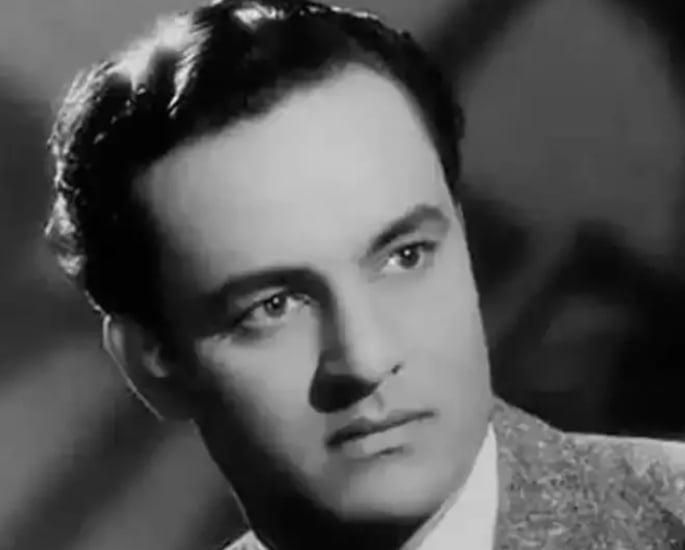 In 1969, Kishore Kumar, who was previously an actor, became a full-time playback singer with the release of Aradhana.
In 1969, Kishore Kumar, who was previously an actor, became a full-time playback singer with the release of Aradhana.
In the film, Kishore Da sang evergreen chartbusters for Rajesh Khanna.
This began a tidal wave of success for Kishore Da who went on to become the most popular male playback singer of the time.
Kishore Da’s success proved to be tough competition for Mukesh Sahab, who was somewhat overshadowed.
However, this did not affect the admiration between Kishore Da and Mukesh Sahab, who also sang plenty of songs together.
In the 1970s, Mukesh Sahab continued to sing for Raj Kapoor, adorning the showman in films such as Mera Naam Joker (1970) and Dharam Karam (1975).
The film Anand (1971) featured Rajesh Khanna in the lead role.
Against the norm, Kishore Da was not chosen as Rajesh’s voice in the film. The composer Salil Chowdhry felt that Mukesh Sahab would be perfect for the soulful songs.
This instinct worked wonders as Mukesh Sahab infused life into ‘Maine Tere Liye’ and ‘Kahin Door Jab Din‘.
In 1974, Mukesh Sahab won a National Award for ‘Kahin Baar Yunhi Dekha‘ from Rajni Gandha.
Mukesh Sahab was a popular attraction during live shows. He performed worldwide and had a keen fan following in the Caribbean.
Radio announcers throughout Trinidad and Tobago announced Mukesh Chand Mathur as none other than ‘The Mighty Mukesh’.
In 1976, Mukesh travelled abroad with Lata Mangeshkar for a nationwide tour of the US and Canada.
On August 27, 1976, minutes before the penultimate show in Detroit, Michigan, Mukesh Chand Mathur passed away due to a heart attack at the age of 53.
The following shows were cancelled and his body was flown back to India.
Upon receiving his body, Raj Kapoor lamented: “Our friend here went to America as a passenger and has come back as luggage.”
A Legend Lives On
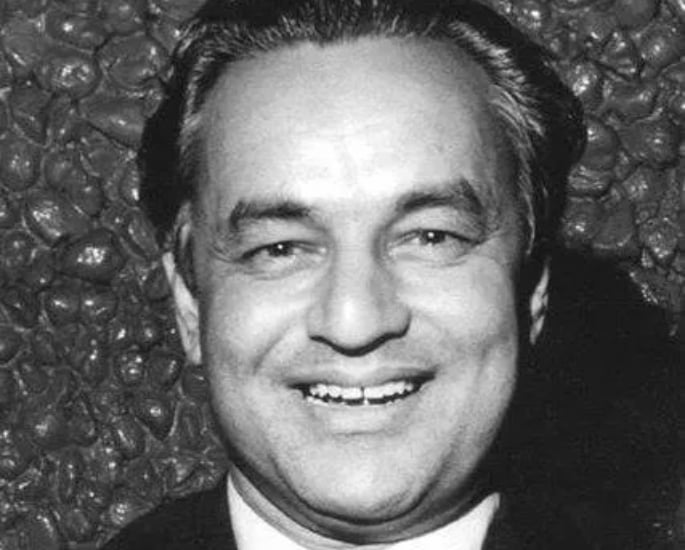
5 Unique Facts About Mukesh Chand Mathur
- He used to take loans from vegetable vendors before finding fame.
- He sang over 1,200 songs in his career.
- He once said he would give up 10 happy songs for one sad song.
- He gave Manhar Udhas a song he was supposed to sing in 'Abhimaan' (1973).
- He encouraged his son Nitin to learn from Mohammad Rafi to become a good singer.
In 1977, Mukesh Chand Mathur posthumously won a Filmfare Award for ‘Kabhi Kabhi Mere Dil Mein‘ from Kabhi Kabhie (1976).
Two months after his death, Lata Mangeshkar returned to America to complete the concert as a tribute to Mukesh Sahab.
Remembering Mukesh Sahab, Lata Ji says: “There was no question of any stress with Mukesh Bhaiyya. He was a saint.
“There was plenty of pathos in his voice which used to touch the hearts of listeners.
“With Kishore Da, there were a lot of jokes during the recording.
“Mukesh Bhaiyya brought with him a lot of spirituality and purity into the studios.
“It was like being in a temple when I sang with him.”
In 2024, on the occasion of Mukesh Sahab’s 101st birth anniversary, Udit Narayan said:
“Since we came to our senses, we have been listening to his songs.
“For as long as we have this earth and this sky, Mukesh Ji’s voice will be in our hearts and that will never leave.”
Mukesh Chand Mathur is an undisputed legend of Indian music.
His nasal voice will always shine in glory within Bollywood annals.
So if you are seeking to acquaint yourself with the music of cinema’s Golden Era, there is one name you mustn’t forget to embrace.
The powerful and the soulful, Mukesh Chand Mathur.




















































